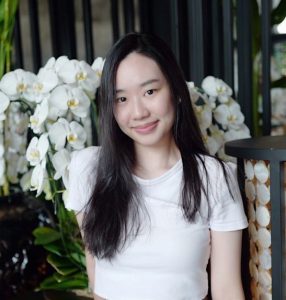Welcome to the Meet our Sustainability Scholars blog!
The Sustainability Scholars are international students that were awarded the DMU Sustainability Scholarship. Our scholars are from all across the world and are extremely passionate about the Sustainable Development Goals and sustainability. The scholars sat down with Dennis (Learning for Sustainability Frontrunner) to answer a few questions to get to know them better. Here’s our seventh scholar, Patharakan!
Dennis: Welcome! Welcome Patharakan! Tell me a little about yourself.
 Patharakan: Hello, my name is Patharakan Tangsahamaitri. I’m from Thailand. I graduated with a BSc in Media Production from De Montfort University. I then pursued a master’s degree in Fashion Management and Marketing. I am deeply passionate about the fashion industry, and I am always up-to-date with the latest trends. This is why I am interested in sustainable fashion currently.
Patharakan: Hello, my name is Patharakan Tangsahamaitri. I’m from Thailand. I graduated with a BSc in Media Production from De Montfort University. I then pursued a master’s degree in Fashion Management and Marketing. I am deeply passionate about the fashion industry, and I am always up-to-date with the latest trends. This is why I am interested in sustainable fashion currently.
Dennis: That’s great! Really good so see that you are carrying on with your life journey at DMU. Seeing that you are no stranger to DMU, how have you been settling into this new chapter in your academic journey?
Patharakan: I graduated from De Montfort University as an undergraduate and feel very comfortable and confident in this environment. However, to further my knowledge and abilities in the fashion industry, I recognize the need to prepare extensively before each class in order to understand the concepts of marketing and management in the fashion industry that are crucial to success. Through continued practice and hard work, I aim to build my confidence and develop an attitude towards fashion, ultimately striving to find a role that aligns with my skills and interests.
Dennis: I can definitely feel your excitement for the fashion industry. Earlier you stated that you were interested in sustainable fashion. Can you tell me how your interest begun in sustainability and the Sustainable Development Goals?
Patharakan: Over the years, I have become increasingly aware of the need to reduce my consumption of clothing from the fast fashion industry. The presence of dyes resulting from landfilling or incineration contributes to the burden on our planet. Moreover, many fashion brands have reduced their production costs by taking advantage of child labour and unfair labour practices. Growing up in Southeast Asia, I was exposed to sustainable local practices such as the use of water hyacinth fiber and the development of local silk. I believe that modern innovations can also be utilized in areas where unsustainable practices are still prevalent to improve the entire process. Moving forward, I strive to find a balance between using sustainable raw materials to support local communities and implementing processes that minimize negative impacts on the environment, aiming to achieve sustainable practices that benefit people, planet, and profit.
Dennis: You have definitely been exposed to the fashion industry from such a young age. How can the SGD’s assist you in your career development in the fashion industry?
Patharakan: Stella McCartney can serve as a great role model for my career development in sustainable fashion. The Sustainable Development Goals (SDGs) have helped me not only to raise awareness among my future target customers but also to garner support from various departments. My business plans, as the owner of sustainable fashion houses, stand to benefit from a shift in customer perception towards sustainability. SDG 12 focuses on sustainable consumption and production, which is in alignment with the ethos of sustainable clothing. More people are beginning to support sustainability initiatives through the promotion of SDG-related activities and campaigns. The more people contribute towards sustainability, the more opportunities I have to extend my knowledge and research on sustainable materials and approaches that can be applied around the world. This can provide opportunities for knowledge-sharing, partnership building, and market growth, which are valuable for business development.
Dennis: It seems like I’ll need to hire you in the future to help me with my fashion, especially with making sustainable choices. To wrap up our conversation today, if you had one wish that you could only use on sustainability and the SDGs, what would it be?
Patharakan: It would be for the advancement of technology in renewable resources for clothing fabrics, among other things. This wish would help achieve SDG 7, 9, 12, and 13 by making the entire fashion industry more sustainable and reducing its impact on the environment. For example, SDG 12 on sustainable consumption and production can be achieved through the use of biodegradable materials in product design and manufacturing processes, which can reduce waste and environmental impact. While waiting for the advancement of technology in renewable resources, there is a risk that the environment could be further degraded and harmed, which highlights the urgency for action and the need for immediate solutions. So, I wish that there were already renewable resources available for sustainable solutions, as the need for sustainable solutions is urgent.
Dennis: Yes, I definitely agree that the need for sustainable solution is indeed urgent. Thank you so much for the quick chat. I wish you all the best in your studies!
For more information about the DMU Sustainability Scholarship, please contact the Sustainability Team at sustainablility@dmu.ac.uk. Don’t forget to follow us on all our social media sites @SustainableDMU.
